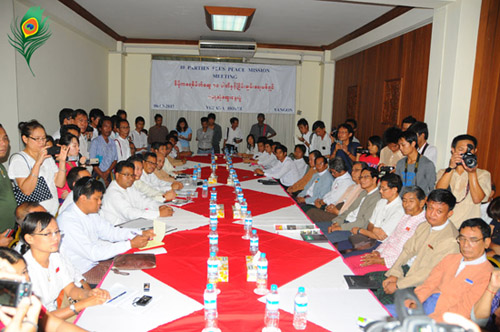Htun Aung Gyaw, 63, the first chair of the All Burmese Students' Democratic front (ABSDF), told a Bangkok audience on Monday that Burma needs a further democratic push before the majority of Burmese exiles would return home.
 Returned from a Sept. 1 to Oct. 14 visit to Burma, along with key colleagues, he spoke to the Foreign Correspondents Club to recount his and his group’s impressions of today’s Burma.
Returned from a Sept. 1 to Oct. 14 visit to Burma, along with key colleagues, he spoke to the Foreign Correspondents Club to recount his and his group’s impressions of today’s Burma.
Now a US citizen, Aung Gyaw, said Burma would never be stable until all ethnic groups could achieve reconciliation with the military and the government.
“In our meetings with various ethnic leaders, they wished for peace and stability for their people. We observed that Kachin and Shan, for example, want to be included in the union, not be independent. What the ethnic groups need is equal rights and self-determination,” said the Cornell University alumni, according to a story in The Bangkok Post on Tuesday.
Ko Mu Tha, 48, an American business entrepreneur, said peace was needed throughout the society to achieve further democratic progress.
“The government is still very concerned about security. There requires a change of mindset inside Myanmar if it wants an uplift; quick change is needed in sanitation and health improvement,” said Mu Tha, also an American citizen.
The ABSDF peace delegation was called for six million Burmese exiles around the world to return to help develop Burma.
“Burma needs skills from all fields which exiles could easily provide. The bureaucracy is very weak, every sector has untrained people. To encourage exiles to return, the government must issue an amnesty statement first,” said Aung Gyaw.
Ko Ko lay, a former ABSDF information secretary, said the sticking point for peace and reconciliation remained Burma’s constitution.
“But the government is still able to do something, apart from the charter amendment, that is to push for further democratic reforms in other elements before the upcoming election in 2015,” said Ko Lay, who is also an American citizen.
Ko Lay said the group discussed peace issues with the President’s Office Minister Aung Min.
Aung Min, the exiles said, pledged there would be positive news on the Kachin peace talks soon.
The group declined to comment on the Rohingya–Buddhist clash in Rakhine State, saying that it involved the controversial issue of religion and ethnic identity.
“How the matter is interpreted is upon the majority of people inside the country; we cannot talk about it. It’s complicated and delicate,” said Aung Gyaw.
One of the most troubling issues is the business climate, he said. “The most worrisome development is land grabbing in industrial zones, and beach control by the cronies,” he said.


